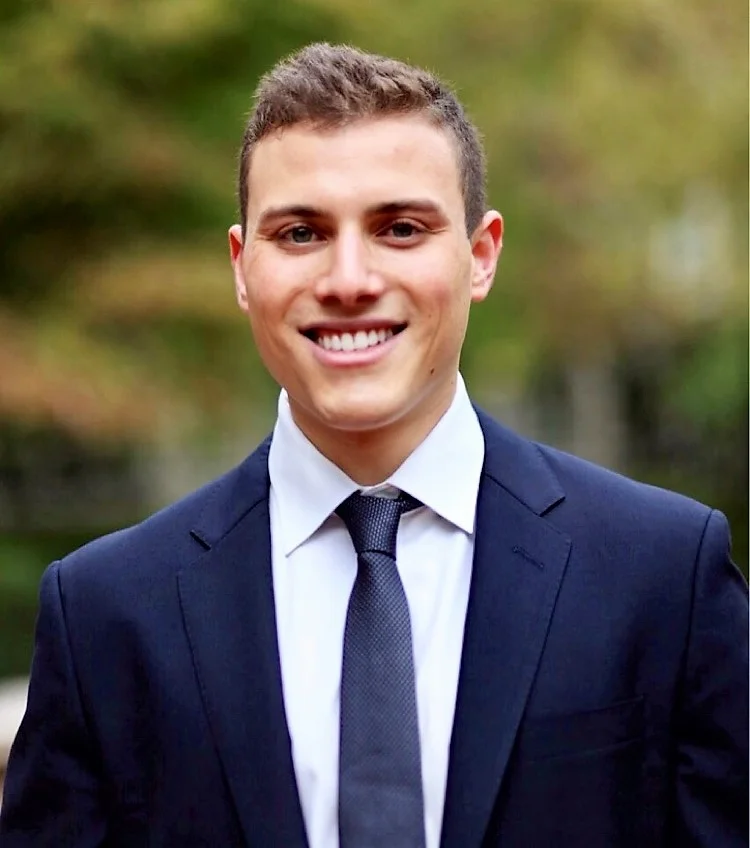Joshua Barrett '19 is pursuing his MBA at Columbia Business School and medical degree at Georgetown. Josh is VP of External Relations for the Healthcare Industry Association (HCIA), participates actively in student life, and has already interned with several organizations. This is how he spent his first year in business school.
This interview was conducted by Pamela McKelvin, Program Manager of Columbia Business School’s healthcare program.
Describe yourself in 3 words.
Passionate (about healthcare and medicine), dedicated (to my studies and helping patients), enthusiastic (about my future, and impact to the field)
Why healthcare at Columbia Business School?
I applied from medical school because I've always been interested in the business of medicine and healthcare. Healthcare as we know is a gigantic business in this country and also globally. I felt that a lot of doctors, especially my peers and the attending doctors with whom I would be working, did not appreciate all the business, management and financial aspects affecting patient care.
For instance, if a patient cannot afford a medication what’s the use in prescribing it? How is that helping the patient or the organization? Are there more cost-effective opportunities to provide higher quality care for patients compared to maintaining the status quo? These factors encouraged me to get my MBA. My goal in the future is to use both my MD and MBA to make a difference for patients.
What is your favorite Healthcare and Pharmaceutical Management Course and Why?
It’s hard to pick a favorite because I have been fortunate enough to use things I’ve learned in all of the courses during my internships. I enjoyed Economics of Healthcare and Pharmaceuticals with Professor Lichtenberg and Strategy and Competition in Pharmaceuticals and Biotechnology with Cliff Cramer. But if I had to choose one, then I would pick Investing in Medical Technologies with Professor Efrem Kamen. The course was totally novel to me and blew my mind. I found healthcare investing and venture capital to be exciting and I obtained knowledge beneficial to my internships.
Tell us about your role as VP of External Collaborations in HCIA?
My role in HCIA is to build community and facilitate cross collaboration with the schools and student clubs at Columbia University and other prominent business schools that are focused on healthcare. HCIA is being more intentional about these partnerships. This year, for instance, we are taking a more active role with the Mailman School in planning and organizing the Case Competition to increase participation by Columbia business students interested in healthcare. We plan to continue collaborating with the Irving Center for Clinical and Translational Research to address multidisciplinary healthcare issues, such as the opioid epidemic. We have also started cross promotion of key events like our Healthcare Conference with other business schools like Wharton, Harvard, and Duke.
And are you a member of other student organizations at Columbia?
Yes, I am also Executive VP for Citizenship for CBS Student Government. It’s an important role where we are focusing on three different areas: mutual respect, leadership, and integrity. We believe every CBS graduate should have these values instilled in them by the time they graduate so they can dedicate themselves to their work ethically and give back to the community after they graduate and in the future.
What events or speakers have most impressed or been impactful to you while at CBS?
Two come to mind: the first was the HPM event last April, Will Amazon/JP Morgan/Berkshire Hathaway Disrupt Healthcare Delivery & Costs?, which focused on private sector efforts to disrupt the industry. It was very relevant because during that time I was interviewing for my summer internships and almost half of the interviews involved questions about Amazon or Walmart or Alibaba entering healthcare and how that impacted strategy. I was able to respond confidently as a result of hearing those speakers who were fantastic and knowledgeable.
The other example was a speaker in my Economics in Healthcare class, Dr. Klaus Kjaer, who is Head of Quality and Patient Safety at Weill Cornell Medicine. Taking that course is how I made the connection with Dr. Kjaer who turned out to be my boss and supervisor during my summer internship. We clearly share a common interest as he also has a MD/MBA dual degree.
Tell us about your in-semester and summer internships
I interned at a Startup health insurance company called Centivo. They provide health insurance plans for employers. Say you’re an employer with a hundred different employees scattered in a few different states - Centivo will build a personalized network centered on value-based care providers, particularly primary care doctors, who can provide healthcare to this set of employees at a lower cost than a traditional plan could. It’s in the trend of what some of the larger companies like JP Morgan and Amazon are doing, but it’s focused on a smaller employer base with similar ideas and methods. I got the internship through a direct CBS connection. One of my classmates worked at a previous startup with the founder of Centivo. She suggested I reach out to him and through her network made the connection. I got a phone call, then an in-person interview, and landed my in-semester internship.
For my summer internship, I worked at Weill Cornell Medicine in the division of Quality and Patient Safety, focusing on opioid prescribing. My project consisted of three key components: developing an opioid dashboard to collect data on opioid prescribing patterns; publishing a resource toolkit on safe prescribing and pain management; and advocating to health plans for improved insurance coverage of non-opioid pain therapy. As previously mentioned, I learned about this opportunity from a guest speaker in Professor Lichtenberg’s Healthcare Economics course.
How did you balance a full-time MBA and an in-semester internship?
Business school is all about priorities and what matters to you the most. So if you really want that in-semester internship, then you must be willing to go in on Fridays, sacrifice a night out during the week, and dedicate your time to make that internship happen. Do a good job and make a good impression with that company.
What is the best thing about living and studying in NYC?
There are so many incredible opportunities that we have in New York and at Columbia. My in-semester internship was here, my summer internship was here, and the vast network of change makers in healthcare are here. Being able to take the subway to have a coffee chat with high level MBAs at New York-Presbyterian to healthcare investors in venture capital and private equity firms is invaluable. On a personal note, my brother lives in the city and my parents are close by. So it’s really great to be near my family, too.
Where do you see yourself in 10 years?
Probably still studying somewhere. As a doctor you want to always stay abreast of what is going on in the field, and as a businessman you want to stay knowledgeable about the trends in your particular field to anticipate and guide your career or role in a company accordingly. So I would be a lifelong learner in medicine and in business, using both degrees to ultimately make an impact and a difference as a doctor and a businessman in healthcare.
What inspires you most?
My family; my parents especially because they really instilled the need and importance of education in my life and demonstrated firsthand how crucial it is to have those degrees. Not just for my personal benefit but to use in the future to help the lives of patients and advocate the wellbeing of others. They lived that in their own lives and passed that on to their own kid’s. I am extremely grateful for that. Specifically seeing them love what they do and being able to make that difference- there is no greater inspiration and model to follow.
Tell us something about you that we wouldn’t find on your LinkedIn.
I love to travel especially with family and friends from business school. This summer, I was fortunate to visit Thailand on a Columbia Chazen trip. The insight into how Buddhist principles shape Thai companies as well as the special bonds and memories made with fellow CBS students will resonate with me well after graduation.


